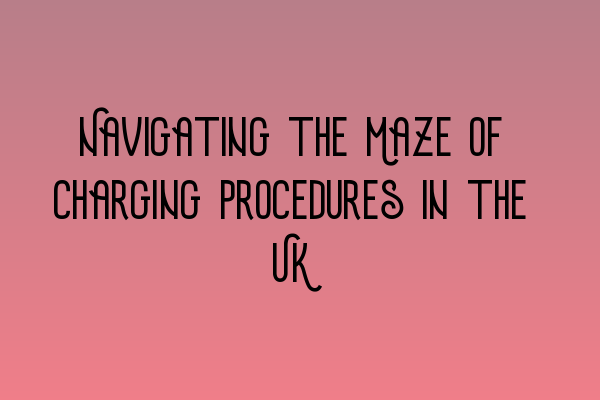Navigating the Maze of Charging Procedures in the UK
Introduction:
Charging procedures in the UK can be complex and confusing, making it crucial for legal professionals and aspiring lawyers to have a clear understanding of the process. Whether you are a solicitor, barrister, or law student studying for the SQE Criminal Law & Practice exams, being well-versed in the charging procedures is essential for your success.
In this comprehensive guide, we will break down the charging procedures in the UK, providing you with a step-by-step understanding of the process. We will explore the different stages involved, discuss the roles of various parties, and highlight key considerations at each stage.
So, let’s begin our journey through the maze of charging procedures in the UK!
1. Pre-Charge:
The pre-charge stage is where a suspected criminal offense is investigated by law enforcement agencies, such as the police. If they believe there is sufficient evidence to support a charge, they prepare a file for consideration by the Crown Prosecution Service (CPS). The CPS is responsible for making charging decisions, taking into account the evidential and public interest tests.
During this stage, it is crucial for legal professionals to be aware of the relevant laws and regulations surrounding pre-charge procedures. Understanding the rules governing arrest, detention, and interview procedures is essential for ensuring fair treatment of suspects and compliance with human rights principles.
2. Charging Decision:
Once the CPS receives the file, they assess the evidence and determine whether there is a realistic prospect of conviction. They consider factors such as the strength of the evidence, witness credibility, and any potential defenses raised by the suspect.
In some cases, the CPS may decide not to proceed with a charge due to insufficient evidence or lack of public interest. Alternatively, they may opt for a lesser charge if the evidence does not support the original offense. Understanding the factors that influence charging decisions can help solicitors build strong cases for their clients or, for law students, answer exam questions effectively.
3. Charging Document:
If the CPS decides to proceed with a charge, they will issue a charging document, known as an “indictment” in more serious cases or a “summons” for less serious offenses. The charging document specifies the offense(s) alleged and outlines the details of the case.
As a solicitor, it is important to carefully review the charging document to ensure that the allegations are properly formulated and reflect the evidence gathered. Being meticulous at this stage can make a significant difference in the outcome of the case.
4. First Court Appearance:
Once a charging document has been issued, the suspect is brought before a court for their first appearance. The purpose of this initial court hearing is to ensure that the suspect understands the charges against them and to gather basic information for the court record.
Legal professionals must be prepared to guide their clients through this process, ensuring their rights are protected and that they understand the implications of the charges they are facing. Adequate preparation and effective representation at this stage can set the tone for the entire legal proceedings.
5. Mode of Trial:
After the first court appearance, the next crucial step is determining the mode of trial. This decision determines whether the case will be heard in the Magistrates’ Court or the Crown Court.
Factors such as the seriousness of the offense, the defendant’s right to elect, and any resulting sentencing powers are considered during this assessment. Solicitors and barristers must be aware of the criteria and implications for each court, as they will need to advise their clients on the appropriate option to pursue.
6. Plea:
At the next stage, the defendant is required to enter a plea, either guilty or not guilty. The plea has significant implications for the subsequent stages of the trial process. If a guilty plea is entered, the case will proceed to sentencing. If a not guilty plea is entered, the case will proceed to trial.
In some cases, legal professionals may need to negotiate plea agreements with the prosecution, considering factors such as potential sentence reductions or the avoidance of more serious charges. Understanding plea bargaining techniques and its implications can greatly benefit solicitors representing their clients.
Conclusion:
Navigating the maze of charging procedures in the criminal justice system of the UK can be daunting. However, by understanding the step-by-step process and having a comprehensive knowledge of the relevant laws and regulations, legal professionals can effectively guide their clients through each stage of the proceedings.
For aspiring lawyers studying for the SQE Criminal Law & Practice exams, mastering these charging procedures is critical for success. By familiarizing themselves with pre-charge procedures, charging decisions, charging documents, first court appearances, mode of trial considerations, and pleas, they can confidently tackle questions related to charging procedures and stand out from the competition.
Remember, success in criminal law practice requires continuous learning and staying updated with the latest developments and advances in the field. For additional resources on enhancing your SQE Criminal Law study group experience, decoding criminal evidence rules, public prosecutions in the UK, uncovering police procedures, and gathering crucial evidence in criminal cases, be sure to check out the related articles below:
– Enhancing Your SQE Criminal Law Study Group Experience
– Decoding Criminal Evidence Rules: A Detailed Analysis
– Public Prosecutions in the UK: A Closer Look at State Prosecution
– Inside Look: Uncovering UK Police Procedures in Criminal Cases
– Gathering Crucial Evidence in Criminal Cases: Methods and Techniques
By staying informed and continuously honing your knowledge and skills, you will be better equipped to excel in the challenging world of criminal law practice in the UK. Good luck on your journey!
